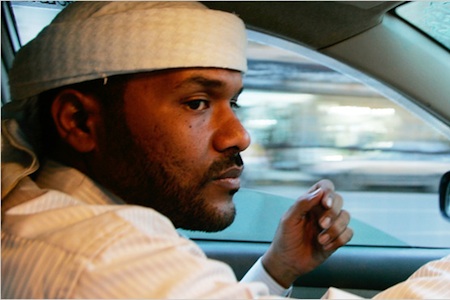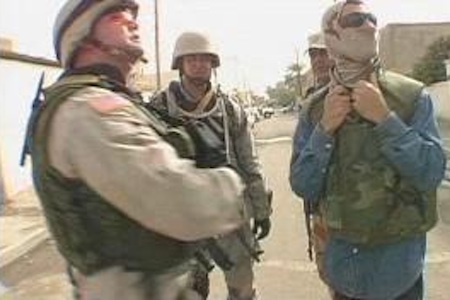[Editor’s note: Embattled filmmaker Laura Poitras has been making headlines not just with her difficulties crossing borders—she was placed on a “Watch List” after creating My Country, My Country, about the Iraqis under U.S. Occupation—or with the chilling trailer for her new film, The Program, accompanying a New York Times ‘Op-Docs piece. She’s most recently in the news for winning a MacArthur ‘Genius’ Grant, which was announced October 2nd. What follows is a 2010 interview with Poitras regarding a film then in release, The Oath.]
The Oath, a documentary from filmmaker Laura Poitras (My Country, My Country and Flag Wars), focuses on an unusual family drama in the lives of Osama Bin Laden’s former bodyguard, Abu Jandal, and driver, Salim Hamdan. Poitras followed Jandal for two years in Yemen, bearing witness to the anger and guilt he felt about his brother-in-law Hamdan being detained at Guantanamo. Poitras, who showed the film at festivals including the San Francisco International (SFIFF), studied filmmaking at the San Francisco Art Institute and now teaches filmmaking at Yale University. She won the Sundance Film Festival’s Excellence in Cinematography Award when this interview was conducted in 2010 and was previously nominated for an Academy Award, an Independent Spirit Award and an Emmy Award for My Country, My Country. She is currently at work on a collection of films about post-Sept. 11 America. I spoke with Poitras two years ago in San Francisco, where she talked about the filmmaking process and how her journey with Jandal and Hamdan took her in unintended directions.
Keyframe: You went to Yemen in search of a story about an innocent person returning from Guantanamo. Instead, you met Abu Jandal, and the story changed. How did this change affect the timeline, budget and overall production process? Was the team supportive of the decision?
Laura Poitras: I think if I’d been on assignment to tell the original story, it would have been a problem because I would have felt like I’m not delivering on the story I was sent to tell. But because I had a couple fellowships when I went there, I had the freedom. The story was allowed to change. There was not really that much questioning of it. I certainly questioned it as an artist. I had to grapple with what does it mean? They’re very different stories: an innocent person versus Osama Bin Laden’s bodyguard. There was never any need to justify it to anyone like a funder at that point in the process, because I was on fellowship. Then I was like, I just need to trust my own instincts. I tend to, because I do my own camera work. I can go alone and just be really patient. And this film really would never have happened if I’d been with a crew and somebody was looking at their watch and counting out the hours because there was so much time of just waiting and just being there and saying, ‘OK I’m still here, I still want to get this.’
When I made the film in Iraq (My Country, My Country), I was shooting a lot, so I felt busy, but it wasn’t until I was like 90 hours into the shooting that I felt like I was getting what I needed to [for] the film. But I was busy. With this film, there was a lot of downtime, which can be very corrosive. It was like, ‘Is this going to happen? I’m not quite sure, there’s not enough access right now.’ It was just about saying, ‘Look, I think the story’s going to yield what we want, it’s just not going to do it on the timeline that I want.’ I’ve been through this process enough times to have the faith that it was going to be worth being patient for. But it could have not worked. It wasn’t until a year in when I said, ‘OK, this is really going to come together. I’m going to be able to finish this film.’ And if it hadn’t, it happens all the time where you go down this road and you just for whatever reason can’t complete it. But because I do my own shooting, it gives me somewhat more: I can get on a plane, I have a camera and I can live in Yemen. It wasn’t like I was paying a DP or a sound person a day rate while I was waiting.
But I did bring in Jonathan Oppenheim, the editor, very early in the process. And he’s extraordinary. It was definitely such a hard story to tell that I didn’t want to carry the burden of it alone. I really wanted somebody else to sort of dig in. So we needed funding for that. The editing was certainly out of proportion for a typical documentary because he was working on it for so long. It was actually what was needed in this film. Overall, on one hand it took a little over two years to make, which really is not that long for a documentary. But it felt like much longer because there was so much waiting. The final budget was around $700,000. And it was first through fellowships and grants and then ultimately ITVS came on. I think that there was a concern, once I knew that the story wasn’t going to be about this innocent returnee–it was going to be this much murkier anti-hero taxi driver–I thought we’re not going to get funding. This is kind of dangerous territory. But I was really surprised. Sundance Documentary Fund came on board, Chicken and Egg, Creative Capital; there was so much support. So it was great, because I thought that the door was closed because people will say this work is great, we just can’t get behind it. It’s too sensitive.
Keyframe: How did you meet Abu Jandal?
Poitras: It was actually by accident. I went to Yemen. I was there with a lawyer who was representing Guantanamo prisoners and we were working with the Yemeni journalists who knew [Salim] Hamdan’s family. And that’s when I was brought to Abu Jandal. I knew pretty instantly that it was a really compelling story and I started pursuing it immediately. But there was another part of me that was like, ‘This feels risky.’ It still feels risky. It’s dangerous territory.
Keyframe: Never having made a documentary myself, I’m curious: How do you get in touch with these lawyers and journalists? Did you set up meetings before going to Yemen or did you just go to Yemen with this idea for a story?
Poitras: The first thing I did was say OK, I want to do something about Guantanamo, and I was interested in this idea of someone returning. I contacted Clive Stafford Smith, who runs an organization called Reprieve in the UK. He invited me to a conference for lawyers in Guantanamo. So I went to Oxford and introduced myself as a filmmaker and said I was interested in doing something. There were several lawyers there. One of them was David Reams. He invited me to go to Yemen. In a certain way, you have to cast a net. I know the sort of broad themes that I’m interested in, but I need people who are going to embody the story, and it can go in different directions. If I didn’t meet Abu Jandal, I would have made something else. It might have been a different story, but some things would have overlapped. So I went to Yemen and met Abu Jandal the second day there and said OK I’m going to come back. And then I came back and he kept saying yes, but then would say, ‘No, not today.’ So there was a lot of just being patient.
I teach, and what I always tell people who are thinking about doing something is you just have to do it. The act of going out to do it will then yield something, which might look different than what you set out to do, but it’s never going to happen if you’re just thinking about it.
Keyframe: Independent filmmakers are shifting gears and realizing that the distribution model is evolving. What do you think is the purpose of independent filmmaking and how do you envision the newly evolved independent filmmaking model?
Poitras: I’d answer that in different ways. I understand all the shifts, and everyone’s trying to grapple. I think as filmmakers we need to keep all that sort of stuff in our peripheral vision. We all should also just fight for what we want as artists. So if I’m a writer and I want it to be a novel, I want it to be a book and not a computer screen. I personally as a filmmaker want the cinematic theater experience of a dark room with strangers. Nothing is like that. It’s the place I love to go to. As a kid, I grew up in the theater. And I don’t think it’s going away. It’s obviously not a viable market for a lot of independent films that are getting made. It’s not going to sustain itself. But personally, as an artist, I want a theater. I want strangers sitting together and watching it and taking a captive audience that’s not checking email to go on a journey with. You have this time to go. So I fight for that. I’m thrilled about working with a distributor like Zeitgeist, who’s still committed to doing that. I think it’s a really tough time for people coming up because there are so many films out there and very few films are going to be viable theatrically. So I think there will be other models. I do think there’s a new generation of artists growing up where interactivity is going to inform how they approach storytelling and that’s really important.
Keyframe: Do you have any advice for people who have a story to tell, but are hesitant to take the chance and make it into a documentary?
Poitras: A lot of people say ‘I want to make a documentary.’ I think it is a craft and there has to be some attention to the history of documentary. Know what’s been done and learn the craft. Learn about shooting and editing. It doesn’t just happen overnight. You don’t necessarily have to go to school for that. But see a lot of stuff and work your skill sets.
This article appeared in a different form in SF360.org May 16, 2010.





